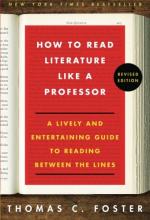|
This section contains 1,255 words (approx. 4 pages at 400 words per page) |

|
Summary
Chapter 26 – Foster discusses irony in this chapter. Foster contends that irony trumps everything. He begins with the use of roads, which are meant to be taken, and are meant for journeys. Ironically, in “Waiting for Godot”, the two characters travel down a road hoping to learn something from, and meet up with Godot, only for Godot to never show up, and the road to have led to nowhere. Hemingway’s novels about World War I, such as “A Farewell to Arms”, employ a tremendous amount of irony, from youth meeting death on the battlefield to the title itself: instead of men rallying “to arms” to fight, they are bidding a farewell “to arms”. In G. K. Chesterton’s “The Arrow of Heaven” a priest in a high tower is killed with an arrow, leading many to believe he has been shot by...
(read more from the Chapters 26 - Envoi Summary)
|
This section contains 1,255 words (approx. 4 pages at 400 words per page) |

|




